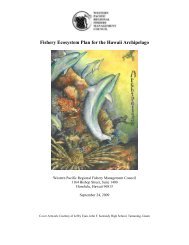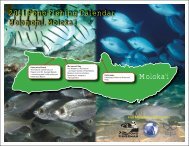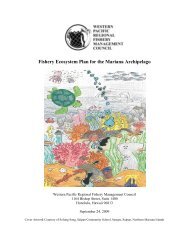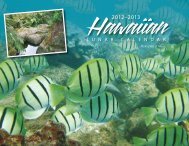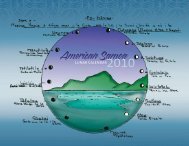Shark Depredation and Unwanted Bycatch in Pelagic Longline
Shark Depredation and Unwanted Bycatch in Pelagic Longline
Shark Depredation and Unwanted Bycatch in Pelagic Longline
You also want an ePaper? Increase the reach of your titles
YUMPU automatically turns print PDFs into web optimized ePapers that Google loves.
<strong>Shark</strong> <strong>Depredation</strong> <strong>and</strong> <strong>Unwanted</strong> <strong>Bycatch</strong> <strong>in</strong> <strong>Pelagic</strong> Longl<strong>in</strong>e Fisheries<br />
a high shark catch rate. Over half of respondents (57%) replied that<br />
a comb<strong>in</strong>ation of different factors result <strong>in</strong> a high shark catch rate.<br />
The majority of these respondents (63%) did not specify these factors.<br />
While 17% replied that alter<strong>in</strong>g fish<strong>in</strong>g position <strong>and</strong> sett<strong>in</strong>g their gear<br />
deeper will <strong>in</strong>crease shark CPUE, 13% of respondents mentioned<br />
that time of month was also an important factor along with alter<strong>in</strong>g<br />
fish<strong>in</strong>g position. One respondent considered the important factors<br />
affect<strong>in</strong>g shark CPUE to be time of the month together with sett<strong>in</strong>g<br />
gear deeper. Another respondent mentioned a comb<strong>in</strong>ation of three<br />
factors (alter<strong>in</strong>g fish<strong>in</strong>g position, sett<strong>in</strong>g gear deeper, <strong>and</strong> time of the<br />
month) as the most important parameters affect<strong>in</strong>g shark CPUE.<br />
Respondents based their answer on their fish<strong>in</strong>g practices dur<strong>in</strong>g the<br />
shark season.<br />
A6.14. Incentives <strong>and</strong> Attitudes on Reduc<strong>in</strong>g <strong>Shark</strong><br />
<strong>Bycatch</strong> <strong>and</strong> <strong>Depredation</strong><br />
Almost three quarters (71%) of respondents <strong>in</strong>dicated that they are not<br />
<strong>in</strong>terested <strong>in</strong> reduc<strong>in</strong>g shark bycatch. Over half (62%) of respondents<br />
noted that they are <strong>in</strong>terested <strong>in</strong> reduc<strong>in</strong>g shark depredation. The<br />
most common reason mentioned for not want<strong>in</strong>g to reduce shark<br />
<strong>in</strong>teractions was because of the high value for sharks. Only a few<br />
respondents replied they would not m<strong>in</strong>d avoid<strong>in</strong>g shark <strong>in</strong>teractions.<br />
This was due to the lower prices paid for sharks dur<strong>in</strong>g mahi mahi<br />
season. Loss of gear <strong>and</strong> time spent repair<strong>in</strong>g gear were mentioned as<br />
the ma<strong>in</strong> reasons why respondents would be <strong>in</strong>terested <strong>in</strong> reduc<strong>in</strong>g<br />
shark depredation. Among the reasons why some respondents (12%)<br />
were not <strong>in</strong>terested <strong>in</strong> reduc<strong>in</strong>g shark depredation were: (i) loss of<br />
gear expenses are already taken <strong>in</strong> account for every trip <strong>and</strong> are paid<br />
by owner, <strong>and</strong> (ii) catch<strong>in</strong>g sharks is profitable.<br />
Over a third (40%) of respondents believes that, <strong>in</strong> the absence of<br />
restrictions on f<strong>in</strong>n<strong>in</strong>g, shark bycatch dur<strong>in</strong>g mahi mahi season<br />
would lead to decl<strong>in</strong>es <strong>in</strong> shark populations. Another third (36%) of<br />
respondents believe it would not lead to a decl<strong>in</strong>e, while the rema<strong>in</strong><strong>in</strong>g<br />
respondents did not know. Reasons provided by those who believe<br />
bycatch dur<strong>in</strong>g mahi mahi season would mean the decl<strong>in</strong>e of shark<br />
population were: (i) summer acts as a temporal reduction <strong>in</strong> shark<br />
capture, which aids population growth, <strong>and</strong> (ii) because people do<br />
not respect m<strong>in</strong>imum capture sizes. Given that shark captures are<br />
not as high as they used to be, fishermen now tend to reta<strong>in</strong> every<br />
shark that gets hooked. Those respondents who believe shark bycatch<br />
dur<strong>in</strong>g the summer would not lead to a decl<strong>in</strong>e <strong>in</strong> shark populations<br />
stated that there are not many shark <strong>in</strong>teractions dur<strong>in</strong>g mahi mahi<br />
season to impact populations <strong>and</strong> that the ma<strong>in</strong> reason for shark<br />
population decl<strong>in</strong>es is <strong>in</strong>teractions with <strong>in</strong>dustrial fisheries <strong>and</strong> the<br />
f<strong>in</strong>n<strong>in</strong>g they perform.<br />
About 62% of respondents stated that their general feel<strong>in</strong>gs about<br />
sharks are that they are economically important. For them, sharks<br />
primarily mean revenue <strong>and</strong> livelihood. One respondent mentioned<br />
that shark work is very hard dur<strong>in</strong>g shark season <strong>and</strong> they should<br />
be better compensated. Only five (12%) respondents stated that<br />
sharks should be under a susta<strong>in</strong>able management program. These<br />
respondents believe that shark populations have decl<strong>in</strong>ed with<strong>in</strong> the<br />
past years, <strong>and</strong> penalties, bans, <strong>and</strong> more controls over m<strong>in</strong>imum<br />
size limits should be enforced for conservation purposes.<br />
110



